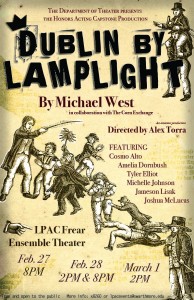The following piece appeared in the most recent issue of The Phoenix.
Theater of Witness covers new ranges of emotional spectrum
 After a brief and interesting, if not completely comprehensive, introduction to the methods of the program, Sepinuck showed a few particularly powerful Theater of Witness performances.The first video featured a man named Hakim Ali telling his story. Ali had committed acts of gang violence, and had not spoken about it or outwardly reflected on it before participating in Sepinuck’s program.
After a brief and interesting, if not completely comprehensive, introduction to the methods of the program, Sepinuck showed a few particularly powerful Theater of Witness performances.The first video featured a man named Hakim Ali telling his story. Ali had committed acts of gang violence, and had not spoken about it or outwardly reflected on it before participating in Sepinuck’s program.
“It’s very healing,” said Sepinuck.
On stage he is full of emotion, the kind of regret and loss that is easy to feel and almost impossible to communicate. Sepinuck shared a story about how the mothers of victims and convicted perpetrators alike were in tears, moved to unabridged expression by the stories of their sons. But none of them were shown on screen, and the distance remained.
Next was the story of a couple from Sepinuck’s film “Raising Our Voice.” The work was inspired by a man who called Sepinuck, requesting to participate after having seen one of her programs. He confessed to committing domestic abuse and told Sepinuck that he kept hearing her name when he was praying. The film opens with a monologue from the man’s wife, who decided to participate in the program after watching him. She fights tears on screen as she outlines a history of helplessness and running away, ending on a note of strength and confidence. The scene then cuts to the man’s own story as the film follows him through a saga of masculine pressure that poisoned his protective instincts of love. The two end up on stage together, dancing closely. The “healing” capability that Sepinuck had referred to earlier was more than just cathartic introspection. It unifies parties that have damaged each other. As the couple dances on screen, there is not exactly forgiveness, but there is still love.
Sepinuck then presented her more recent work on the lives of those who had lost loved ones due to separatist and military violence in northern Ireland. She showed individually narrated short films: one of a young woman named Victoria, whose father was killed in an IRA related bomb attack and one of a young man named Fionbarr, whose father died at the hands of suspicious British police. Sepinuck then showed a Theater of Witness project featuring a young woman who had given herself to the IRA years ago as she tells the story of her impassioned extremism and its abrupt end due to a brain hemorrhage. She is then shown on stage together with the wives of men killed by IRA activity, in an example of the show’s careful exploration of the relativism of innocence and the universality of pain.
To conclude, Sepinuck showed material from her film “Living with Life”, a Theater of Witness project done at the State Correctional Institute in nearby Chester. A group of men sentenced to life in prison are interviewed about their free lives and current emotions at an unexpected, almost inconceivable depth. This is followed by their performance of an original composition by the prisoners, about how they must hold on to some fragments of sanity while confined. It is a perspective on life that, as consumers of a media saturated with grotesquely fantasized prison environments, is almost never seen.












